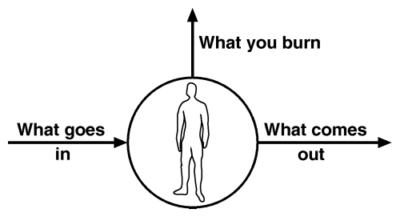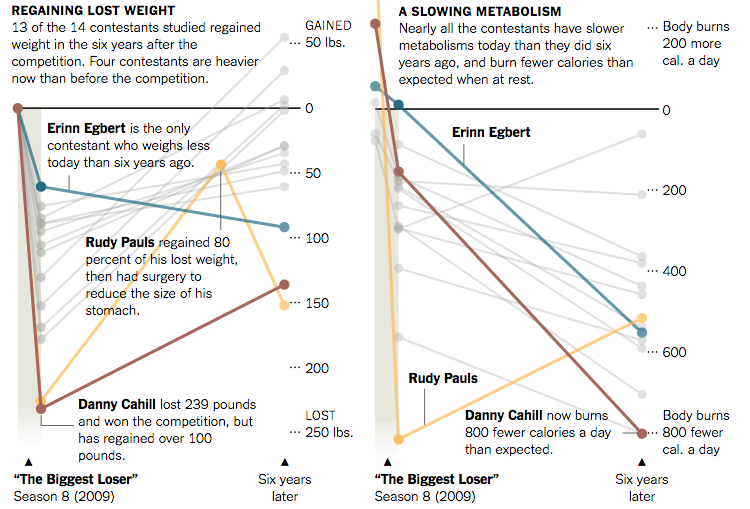Parlour Games
I read a novel a long time ago where the characters played a parlour game at a dinner party. Each player took it in turns to name a prominent work of literature that they had never read and they scored a point for every other person who had read the book. The protagonist won with ‘Hamlet’ and was fired the next day from his teaching position in the English department of a university.
We tried a similar game at work today.
“Which prominent claim of mainstream science do you think is bullshit?”
To reduce the chances of being fired tomorrow, let me first acknowledge that I know I am a crank with this claim. I don’t think I’m as far into the rough as climate science deniers or anti-vaxxers but I know that I am certainly off the fairway. But still…I think the mainstreamers are fooling themselves.
My understanding is that mainstream nutrition science would claim that, when you lose a lot of weight, your body somehow adapts to its new weight and requires less energy. Therefore it gets harder and harder to lose weight because your body has some kind of memory of what it used to weigh and tries to get back to that. This is why most diets don’t work (according to mainstream science).
A stronger version of the theory claims that if you gain weight again after losing a lot, it gets harder to lose weight the second time around because the body “remembers” what it used to weigh and tries to get back to it.
I think this is bullshit because it either requires that my body either a) violate the laws of thermodynamics or b) it requires me to believe that my body chooses to run inefficiently—and burns energy promiscuously—until the day that you start getting somewhere with your diet. On that day, your body switches to “efficient” mode and decides to use less energy.
Sounds fishy to me.
I’m an acolyte of John Walker’s Hacker’s Diet. Mr Walker says it’s useful to think of your body like a closed system where calories come in as food and drink and calories are burned or otherwise exit your system as “solids”.
Here’s Mr Walker:
when it comes to gaining and losing weight, the human body is remarkably akin to a rubber bag. Fad diets and gimmick nutritional plans obscure this simple yet essential fact of weight control: if you eat more calories than you burn, you gain weight; if you eat fewer calories than you burn, you lose weight.
Here’s your body, reduced to a rubber bag.
To determine whether you’ll gain or lose weight—whether the rubber bag will grow or shrink—just take the number of calories in, what you eat, and subtract the number of calories you burn. If the number’s positive, you’re eating too much and the excess calories will stay in the bag; you’ll gain weight. If the result is negative, you’re burning more calories than you’re putting in; the bag will shrink as the reserves stored in fat cells are drawn down to meet the body’s energy needs; you’ll lose weight.
I acknowledge that your body might adapt to starvation conditions by trying to conserve energy in the short term but, in the long term,
calorie excess = calories in – calories out
and the excess is turned into fat at the rate of 3500 kCal/lb.
It is true that it’s harder to lose weight when you are very hungry—but that’s a failure of will, not a suspension of the laws of thermodynamics.
It’s also true (probably) that losing too much weight too quickly can backfire but, again, that’s because you weaken your will, not because your body mysteriously decides to run more efficiently.
It might sound like I am blaming people who fail to lose weight for a lack of will and that’s exactly what I am doing but… take comfort! According to Schopenhauer, it’s not your fault!
Man can do what he wills but he cannot will what he wills.
– Arthur Schopenhauer
The secret to losing weight is to use Jiu-Jitsu on your will. Don’t do anything to cause your will to falter (like losing weight too fast) and don’t keep the beer or the Doritos within easy reach for those inevitable occasions when your will WILL fail.
As I said, this is all crank science and you shouldn’t believe a word of it. Mainstream nutrition science says that when your body starts to lose weight, it gets more efficient so it gets harder to lose weight. I say “Bullshit!”
In next week’s edition edition of Crank Science, we’ll explore whether it’s more likely that 90% of the universe is made of the mysterious and undetectable “dark matter” or that astrophysicists didn’t calibrate their instruments right.
POSTSCRIPT
Lots of feedback in the comments, so I’ll clarify my argument a little.
I’m well aware that smaller bodies require less energy than larger ones. I don’t dispute that.
I’m also aware that if you cut your calorie intake below a certain level, your body goes into starvation mode and burns less energy as it tries to keep you alive. I don’t know the exact details of how this works but it sounds plausible and I don’t dispute it.
I was not previously aware of The Biggest Loser thing but I just read an article about it in the New York Times. This is exactly what I am talking about:
“you can’t get away from a basic biological reality,” said Dr. Schwartz, who was not involved in the study. “As long as you are below your initial weight, your body is going to try to get you back.”
I’ve heard this many times from many different people who accept it as truth.
More from the article:
“But what obesity research has consistently shown is that dieters are at the mercy of their own bodies, which muster hormones and an altered metabolic rate to pull them back to their old weights, whether that is hundreds of pounds more or that extra 10 or 15 that many people are trying to keep off.”
A diagram makes the point more forcefully.
The idea that your body just decides to operate more efficiently when you have lost a lot of weight sounds completely implausible to me but, I have been told on many occasions, this is what the science says.
Dr. Rosenbaum agreed. “The difficulty in keeping weight off reflects biology, not a pathological lack of willpower affecting two-thirds of the U.S.A.,” he said.
The last part of the article shares a more likely explanation.
Slower metabolisms were not the only reason the contestants regained weight, though. They constantly battled hunger, cravings and binges. The investigators found at least one reason: plummeting levels of leptin. The contestants started out with normal levels of leptin. By the season’s finale, they had almost no leptin at all, which would have made them ravenous all the time. As their weight returned, their leptin levels drifted up again, but only to about half of what they had been when the season began, the researchers found, thus helping to explain their urges to eat.
I can completely understand that it’s harder to resist food when you’ve just lost a lot of weight. This is what I was alluding to when I quoted Schopenhauer above and what I mean when I say that losing weight is a matter of will: Hunger hormones sabotage your will; they don’t change the laws of thermodynamics.
A final word about Mr Cahill. This is just nuts:
Before the show began, the contestants underwent medical tests to be sure they could endure the rigorous schedule that lay ahead. And rigorous it was. Sequestered on the “Biggest Loser” ranch with the other contestants, Mr. Cahill exercised seven hours a day, burning 8,000 to 9,000 calories according to a calorie tracker the show gave him.
Mr. Cahill set a goal of a 3,500-caloric deficit per day. The idea was to lose a pound a day.
There’s no way you can sustain that kind of exercise regime. I am comfortable with a 250 calories per day deficit. A good friend of mine has a 1000 cal/day deficit that he has sustained for months. 2,500 calories per day is madness and it’s no surprise to me that:
Mr. Cahill knew he could not maintain his finale weight of 191 pounds. He was so mentally and physically exhausted he barely moved for two weeks after his publicity tour ended. But he had started a new career giving motivational speeches as the biggest loser ever, and for the next four years, he managed to keep his weight below 255 pounds by exercising two to three hours a day. But two years ago, he went back to his job as a surveyor, and the pounds started coming back.
And here’s my argument in a nutshell:
His slow metabolism is part of the problem, and so are his food cravings. He opens a bag of chips, thinking he will have just a few. “I’d eat five bites. Then I’d black out and eat the whole bag of chips and say, ‘What did I do?’”


